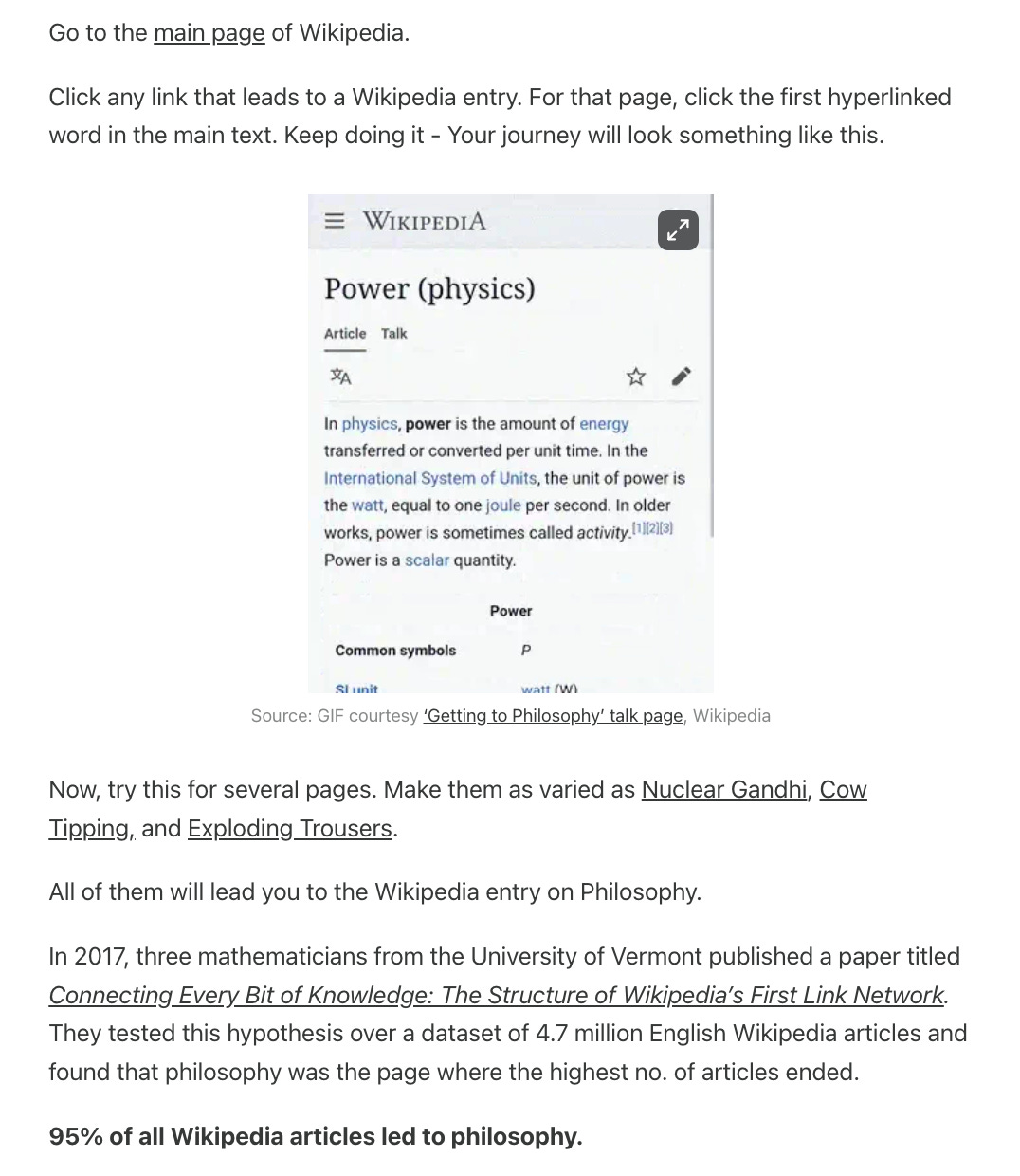📚 Julian on conversational interfaces, How to live intellectually rich life, FIR, Dwarkesh on China, Department of everything
22 Rules of UX, How not to text, DIY influencers, Cozy games and more.
Hello, this is post #206.
I’m in the middle of packing for my vacation and wrapping up all the last-minute things. Between work, interiors, kids, travel, and everything else going on, my head’s full of a hundred different threads. So, no introduction today. Let’s jump straight to what we’re covering in this post:
Before we dive in; a quick favour…
If this piece sparks even a tiny ‘hmm’ or ‘aha!’ along the way, do me a kindness: tap the ❤️ or drop a thought in the comments. Curiosity thrives when we trade reflections, not just clicks.
And with that out of the way, let’s get to our main features.
🥸 22 Rules of UX
Valeria Spirovski adapts Pixar’s 22 rules of storytelling for UX. After all, both are about creating memorable experiences.
I’ve captured a couple of snippets for safekeeping:
And this one, it needs some more munching.
In case you want to revisit, here are Pixar’s 22 laws of storytelling.
(via Storythings)
💬 Case Against Conversational Interfaces
just dropped another masterpiece: the case against conversational interfaces. Here's how he kicks things off:
Conversational interfaces are a bit of a meme. Every couple of years a shiny new AI development emerges and people in tech go “This is it! The next computing paradigm is here! We’ll only use natural language going forward!”. But then nothing actually changes and we continue using computers the way we always have, until the debate resurfaces a few years later.
We’ve gone through this cycle a couple of times now: Virtual assistants (Siri), smart speakers (Alexa, Google Home), chatbots (“conversational commerce”), AirPods-as-a-platform, and, most recently, large language models.
What follows is a smart, nuanced take on data transfer, human-computer interaction, and where conversational UIs do make sense—as augmentation, not the whole interface.
Here’s one snippet that stuck with me (honestly, I wanted to quote the whole thing, but let’s keep it tight):
Natural language is great for data transfer that requires high fidelity (or as a data storage mechanism for async communication), but whenever possible we switch to other modes of communication that are faster and more effortless. Speed and convenience always wins.
My favorite example of truly effortless communication is a memory I have of my grandparents. At the breakfast table, my grandmother never had to ask for the butter – my grandfather always seemed to pass it to her automatically, because after 50+ years of marriage he just sensed that she was about to ask for it. It was like they were communicating telepathically.
*That* is the type of relationship I want to have with my computer!
Julian thinks at the very core of how we interact & communicate and packs his insights into highly thought provoking ideas. His “the power of defaults”, “multi-layered calendar”, and “proof of x” have been some of my favorite posts. You’re going to love these. His blog is a goldmine—you’ll want to binge.
🧠 How to Live an Intellectually Rich Life
That’s the opening act of ’s “How to live an intellectually rich life.” What follows is a rare blend of writing and storytelling—I haven’t come across something quite like it in a while.
I had this one saved in my to-read pile for ages, and I’m so glad I finally dove in. Not only did I enjoy it, but I’ve already queued it up for a second read. It’s deep without being dense, rich with insight yet easy to follow. You’ll glide through it, but you’ll want to pause and reflect along the way.
I’m planning to go through it again to absorb more and shape my own take on it.
But don’t wait like I did—just dive in. It’s a long read, yes. But absolutely worth your time, attention, and headspace. You'll walk away with plenty to chew on.
🤝 FIR: Forwardable Introduction Requests
shares some useful ideas on how to ask for an introduction. Here’s a gist of his post:
Make it easier and more effective for introducers to make connections for you by writing them specifically structured emails: Forwardable Introduction Requests (FIR).
Really solid post—short, sharp, and right on point.
I’ve run into this challenge plenty of times and always found it tricky to navigate. But now there’s a clear solution in sight, and I’m definitely giving this one a shot.
🇨🇳 Dwarkesh on China
shared some quick notes after two weeks in China. No sweeping conclusions—just sharp, punchy observations like these…
On output of great construction game
Outside of Beijing and Shanghai (and sometimes even within), you can tell that these skyscrapers were put up by a country with a GDP per capita of $10,000 (and potentially half or quarter than when many of these buildings went up). America and Europe put up a ton of beautiful buildings in the early 20th century when their GDP per capita was similar to China's - one could even argue that those older structures are more aesthetic than anything we're building today in the West. Not so in China. These endless rows of skyscrapers, put up in the construction frenzy of the last few decades, are ugly - boxes of mostly concrete with visible blight and discoloration all over them. If the great construction binge is indeed over, it'll be a shame that China's infrastructure was built out during a period of particularly uninspired architecture.
On freedom of expression
I got quite mixed messages about the state of public opinion in China. This is to be expected in a society where you can't establish common knowledge.
I kept asking young people about the public intellectual landscape in China - who are their equivalents of Jordan Peterson, Joe Rogan, Lex Friedman, and Sam Harris? The sense I got is that this kind of popular intellectual ecosystem just doesn't exist there. Sure, there are viral Bilibili videos from professors talking about practical matters like how to manage your finances. But grand takes about what's happening in the world and what we should do about it? Not much going on.
You can see the video version here, it’s got some slick graphics for those who love video formats more.
If you haven’t come across Dwarkesh’s work before, I’ve covered it in earlier editions #136 and #141. Those episodes are packed with some of the most thought-provoking conversations I’ve heard. Highly recommend giving them a listen.
In #149, I also featured his profile, highlighting his deep curiosity and the methodical way he goes after it—always with the sharpest minds in the game.
It’s been a while since I tuned into his podcast, but I took a quick peek at his latest episodes and found a couple with Tyler Cowen. Expect to see more on his work here soon. He’s too interesting to stay off the radar for long.
📱 How Not to Text, Explained
In Vox’s Today, Explained podcast, Sean Rameswaram and Gabrielle Berbey discuss how not to text.
As the byline puts it: “A guide to text etiquette so simple, even a government official could use it.” That should tell you everything—unless, of course, you’ve been living under a rock and missing all the chaos unfolding in the great land of America.
It’s short, witty, and surprisingly useful.
Don’t use group texts for something that they weren’t created for.
Everybody has that group text from a bachelorette party in like, 2018 that people will still pop into to share photos of their kids. Those have to die once you’re done with the reason that you created them.
If you have a group chat with your parents because you’re related, that can keep going forever, because you’ll always be related. But if you have a group chat to plan a project or a trip or do introductions, that needs to be laid to rest once that planning is over.
I’ve definitely been guilty of this more times than I’d like to admit—and yeah, it’s led to some weird situations. Feels like I’ve found the fix!
🏛️ The Department of Everything
Long before Siri or Google, there were telephone reference desks in major libraries across the U.S. People would call in with their wildest questions, and librarians would work their magic—digging up answers from trusted, well-matched sources.
The department of everything is a brilliant story from the pre-internet era, and honestly, a solid guiding principle for how we might shape the way AI bots work today. A couple of memorable snippets:
On biases, context and sources
The many hundreds of reference sources that we were trained to use in Telephone Reference had their biases, their blind spots, their inaccuracies. In the apprenticeship each of us endured under Milo’s exhausting tutelage before getting anywhere near a telephone, we learned not merely how to find information but how to think about finding information. Don’t take anything for granted; don’t trust your memory; look for the context; put two and three and four sources together, if necessary.
On structured context setting
“Think like a librarian,” Milo used to urge us, which might sound less impressive than “Think like a philosopher,” “Think like a psychologist,” or even “Think like a lawyer,” but it did make the point that information wasn’t given, that it had to be actively sought.
(via MR Blog)
✨ Everything else
Gary Gulman on how the 50 states got their abbreviations. I was laughing all the way! (via Now I Know)
The strange allure of watching other people tear up their homes (Archived here)
Enter the Cambrian explosion of D.I.Y. influencers. Entrepreneurs like Chun building empires from and through their own living rooms offer a far closer and chummier scale for viewers than the polished productions of before. Armed with only a phone camera and a single house (and limitless amounts of pep), these people don’t feel like influencers. They feel like vicarious versions of yourself — if only you had the time, or the energy, or the space.
Cozy Comfort: A new kind of game for me; and it really did feel cozy. I agree, when done right, video games can be the perfect antidote to stress and anxiety.
ICYMI…
The internet moves fast, but great ideas stick around. “40 Principles for making ideas happen”, “Stoop coffee” and “Smoooooothie!” are some of my favourites from last week’s post in case you missed it somehow.
Check them out and more at
That's all for this week, folks!
I hope I've earned the privilege of your time.
If this piece sparked something for you, I’d love to hear what stood out—leave a comment and let’s keep the conversation alive. And if you know someone who’s always asking "why?" or "how come?", pass this along to them. The world gets more interesting every time a curious mind shares what they’ve found.








Thanks for sharing 'How to Live an Intellectually Rich Life' - probably one of the best things I've read in a while.